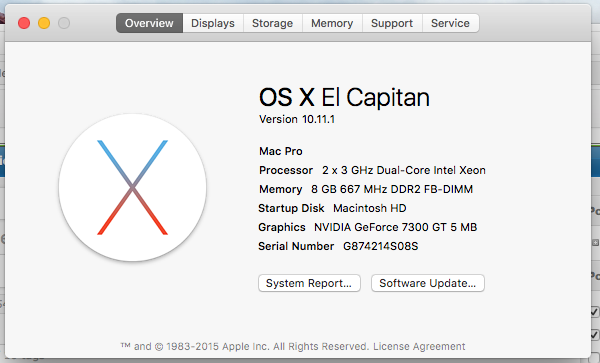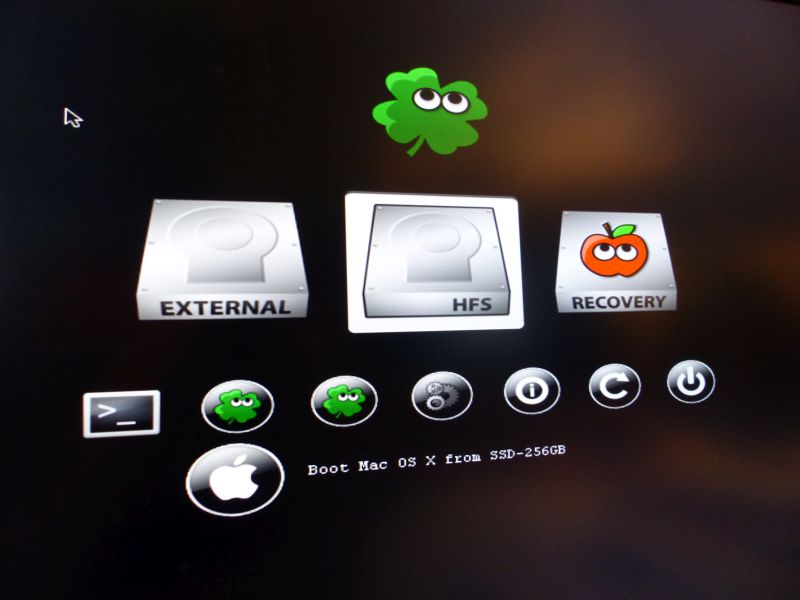
- Mac el capitan upgrade intel dual update#
- Mac el capitan upgrade intel dual driver#
- Mac el capitan upgrade intel dual code#
- Mac el capitan upgrade intel dual windows#
My iMac has a Fusion drive which does not yet support the AFS filesystem. It’s more that I am quite concerned about Apple trading OpenGL for Metal, and for my particular use case, OpenGL seems much better at least today.Click to expand.Upgrading from Sierra to High Sierra was transparent. games, where I think it’s the right choice. I don’t want to completely dismiss Metal, far from it. Just like pointers, I expect latent bugs or performance under-optimizations to crawl in.
Mac el capitan upgrade intel dual driver#
On the other hand, it means all application developers must understand relatively complex GPU/CPU communication and synchronization concepts, instead of just driver developers. On one hand, it may seem like a good thing to give access to command pointers and low-level primitives.

In short, the shader language looks like a few steps forward, a few steps backwards compared to GLSL.Īs for the Metal API itself, it leaves me the save feeling. There are also all the annotations, all the template notations for simple things, etc. In my own experience, I have rarely leveraged a same function between vertex and fragment shaders. It’s a good thing to be able to put vertex and fragment shaders in a single file, except that it forces you to prefix functions with “vertex” or “fragment”. The shader language is also extra verbose. And with ‘in’ and ‘out’, the programmer cannot take the pointer, add 1 and see what happens. Specifying ‘in’ and ‘out’ parameters is a much better way to achieve highest performance, as it lets the compiler select the best way to pass parameters around based on the target architecture, size of the object, etc.

GLSL had proven that you could do a good enough shading language without pointers. It brings all the bad things that go with pointers, e.g. Introducing pointers in shaders doesn’t seem like the best idea in the world either. How would you do something like ShaderToy with Metal? Is there even a way to easily compile a shader dynamically with Metal? A good example is a web browser or Tao3D, since they load the shaders at run time.
Mac el capitan upgrade intel dual code#
But there are also use cases where you want to generate your shader code on the fly. Now, in general, compiling ahead of time has a number of benefits. It’s not a coincidence if Metal shaders are compiled ahead of time instead of JIT like GLSL. The main problem with advanced C++11 features is that they tend to be expensive to compile. Or is it because they don’t want to support virtual functions? Except no inheritance? Why not? Single inheritance, at least, was relatively simple to get. I think templates and classes can bring a new category of higher-level constructs. I am not entirely convinced by Metal at this point, notably by its shading language.
Mac el capitan upgrade intel dual windows#
Apple’s OS X 10.11 “El Capitan” Cranks “Metal”, Imitates Windows 7’s “Aero Snap”.Apple brings its Metal API to OS X 10.11, kicks Vulkan to the curb.
Mac el capitan upgrade intel dual update#
OS X 10.11 will be available to developers very shortly and will be available as a free update for all users later this fall. A solution could be OpenGL on top of Vulkan and Vulkan on top of Metal, or both OpenGL and Vulkan on top of Metal, like OpenGL on this picture: And what about Vulkan, the universal low level API? I only hope that the support of Metal will not take all resources needed to properly update OpenGL and implement Vulkan. OpenGL is currently years behind what it should be (current version is OpenGL 4.1 on OSX while OpenGL 4.5 is available on both Windows and Linux) and it would be nice to have at least OpenGL 4.3 carved on El Capitan’s rock.

Bad news because the future of OpenGL and Vulkan is unclear on OS X. Good news because graphics developers will be able to play with this low level API and add its support to their applications. This new support is a good and bad news at the same time. Apple has announced yesterday at the WWDC (Worldwide Developers Conference), that OS X 10.11 (codenamed El Capitan, the name of the largest monolith of granite in the world, in Yosemite National Park), the new iteration of Apple’s operating system for desktop, will bring the Metal API, introduced last year at the same WWDC, to OSX 10.11.


 0 kommentar(er)
0 kommentar(er)
